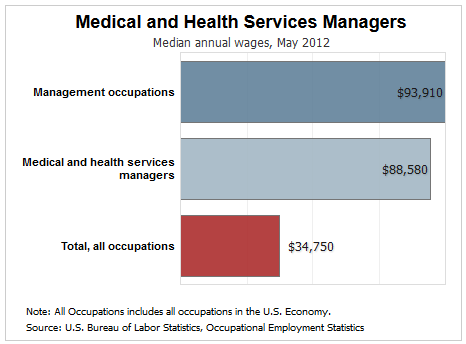
Too often our childhood dreams become labeled in adulthood as âmutually exclusive,â meaning you cannot be both, say, an actress and an engineer. Hollywood glamour star Hedy Lamarr, for example, disproved that bit of logic by being both an actress and inventor (with frequency hopping, at that!). If someone tells you that caring about people is mutually exclusive from earning a lot of money, your answer could be to become a medical and health services manager. The top four positions requiring a degree in healthcare administration are financially rewarding and personally fulfilling.
The Bureau of Labor Statistics (BLS) does not have a Department of Avoiding The Obvious. This explains why they publish the statistic that medical and health services managers work mostly in . . . brace yourself . . . hospitals and healthcare facilities. We did not see that coming!
 According to the BLS, those with educations in healthcare administration earn a median annual income of $88,840. That salary may not mean much until you put it in perspective, courtesy of the BLS:
According to the BLS, those with educations in healthcare administration earn a median annual income of $88,840. That salary may not mean much until you put it in perspective, courtesy of the BLS:
- National annual median salary for all occupations, May 2012â$34,750
- Amount by which the median income for hospital medical and health services managers exceeds the national annual mean wageâ$53,830
- Number of socks you will have knocked off by the next paragraphâTwo (although, to be honest, the BLS does not track your socks)
Hospital Chief Executive Officer
With a solid education in healthcare administration, you could one day rise to become a hospitalâs Chief Executive Officer (CEO), responsible for overseeing management of an entire hospital. This is not only a job with enormous responsibility for the care and comfort of patients, but also an enormous paycheck: the BLS tells us the average annual wage for hospital CEOs is $207,510. So, that knocked your socks off, right?
And almost even better, the total number of registered hospitals in 2013, according to the American Hospital Association? A whopping 5,686. All those hospitals, and each needs a CEOâthat means a lot of opportunity for talented, educated healthcare managers.
Hospital Administrator
Hospital administrators work in nursing homes, outpatient facilities, rehabilitation centers and, naturally, in hospitals. Their work involves hiring doctors, creating policy, putting together budgets and improving patient services. The BLS pegs the average annual income for hospital administrators working in nursing facilities at $85,730.
Patient care is paramount, but keeping up with advances in technology, legal issues, hiring trends and insurance means a hospital director is always learning and growing.
Emergency Medical Services Administrators
Emergency medical services (EMS) work closely with local hospitals, state and county agencies, and law enforcement to respond quickly to medical emergencies. Coordinating that urgent care is the EMS administrator.
Good EMS administrators have a unique mix of compassion, practicality and adventure. While handling life-and-death events on a daily basis, the EMS administrator must also:
- Plan for the future
- Deal with equipment costs
- Oversee staffing
- Coordinate billing and procedures with emergency rooms
This level of work puts an EMS administrator closer to patients than either a CEO or hospital administrator customarily enjoys, so the emotional rewards are potentially enormous. The BLS, which does not have a specific category for EMS Administrator, notes that Emergency Management Directors made an annual median income of $59,770 in May, 2012, with the top 10 percent of Medical and Health Service Managers earning more than $107,810 and the bottom 10 percent earning less than $30,760.
Home Health Services
With Americaâs aging population comes opportunity. Many senior citizens today have the resources to stay in their homes long past the age at which many previous generations sought help in nursing homes, convalescent centers, and rehabilitation units.
Home health services entails placing trained medical staff in patientsâ homes, often for months, to provide one-on-one aid. Administrators coordinate these scattered worksites, oversee staff, ensure patient care, and solve problems every day:
- Transportation
- Emergencies
- Medications
- Coordinating with doctors and specialists
- Communicating with patientsâ families
This application of a healthcare management degree, more perhaps than the others, involves interpersonal skills. Visiting nurses, nursing assistants and others find the flexible schedules and personal care very rewarding, so a home health services administrator oversees a vast network of highly trained, motivated staff members who seldom gather in one place.
Just as their staff members find great personal enjoyment in helping less able members of the community, administrators in home healthcare find emotional rewards in comforting patients and their families.
The BLS statistics show general and operations managers in home health services earning average incomes of $108,100. The rewards can be great both financially and emotionally.
Graduation Day for my Bachelor's of Science in Health Care Administration with ECPI University Cisco Track... http://t.co/C2QY2CXqDO
â Frederick Guild, Jr. (@_golive) May 15, 2015
If your head and heart are balanced between earning a good living and offering hope and help to the community, earning a Bachelor of Science Degree in Health Science with a concentration in Healthcare Administration at ECPI University is an excellent beginning. To learn more about this fulfilling field, contact ECPI today. It could be the Best Decision You Ever Make!
DISCLAIMER â ECPI University makes no claim, warranty or guarantee as to actual employability or earning potential to current, past or future students or graduates of any educational program we offer. The ECPI University website is published for informational purposes only. Every effort is made to ensure the accuracy of information contained on the ECPI.edu domain; however, no warranty of accuracy is made. No contractual rights, either expressed or implied, are created by its content.
Gainful Employment Information
For more information about ECPI University or any of our programs click here: http://www.ecpi.edu/ or http://ow.ly/Ca1ya.


